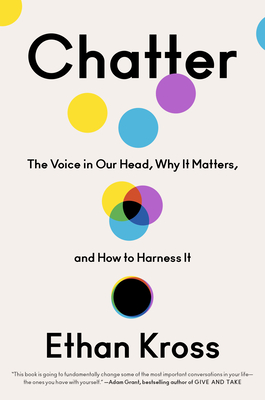Chatter - Book Review
This blogpost summarizes a few points from the book titled, “Chatter” by Ethan Kross

It is an interesting book that focuses on our “inner-talk” that we have within us, whether we realize it or not, consciously. The author calls it “chatter”. We come across “chatter” in our minds in many circumstances;before an important interview/presentation, when we are down because of some temporary setback and we need to gather enough motivation to plod along, upset with ourselves because of some nasty thing that we said to others or the other way around. Is this “chatter” good for us ? Can it derail us, from putting our best foot forward ? Can be somehow work with it make it work for us ? These are some of the questions that the author addresses in the book.
If you consciously pay attention to your thoughts over let’s say 24 hours, you realize that it is very likely that there is at least 2/3rd probability that you either do a time travel in the past or future. You might not necessarily live in the present. Nothing wrong in it, even though there are a ton of books written on staying in the present. Given that our internal dialogue reflects the varying attention patterns that we have in our mind, the author suggests a dozen hacks that one can look at, to ensure that “chatter” does not take us down a self-destructive path.
Some of the hacks that resonated with me are:
- Journaling: Once we put our feelings on paper, somehow there seems to me more clarity in the way we go about handling them. Have followed this in the past and seems to work, at least for me.
- Ritual: This is a hack that I have been following for many years. By following certain rituals before work, you tend to muster motivation to do work, even though you might “feel” like doing the work for whatever reason. Once you follow a ritual based approach to any task, the resistance to doing the activity vanishes. This is a hack that I came across in Twyla Tharp’s book
- Don’t co-ruminate: Sometimes sharing your feelings with others, especially the negative ones, might not help in attenuating those feelings. In fact it might do the exact opposite - it might accentuate the negative feelings and you end feeling worse
- Strategic time travel - I guess this is something most of us anyway do. However if you have a framework to do those futuristic time travels, then the exercise makes more sense. Annie Duke mentions one of such frameworks in her book, “How to Decide”.
- When sharing your thoughts or feelings with others, it is better to assess whether the other person is going look at the situation from both perspectives - emotion and cognition
- Nature walk - Exercise is the best way to get out the “chatter”
- Exposing people to natural sounds, such as rainfall and crickets chirping improved performance on an attentional task. In today’s world, you cannot escape the surrounding noise. To block out the ambient noise, years ago I had invested in noise cancellation headphones. The investment was well worth it. This investment is more than paying of in the COVID world where working from home has become the norm: working from home exposes one to different kinds of ambient noises that might distract you from doing serious work.
There are many other hacks that are mentioned as “Toolbox”. Have made a quick mindmap of the book